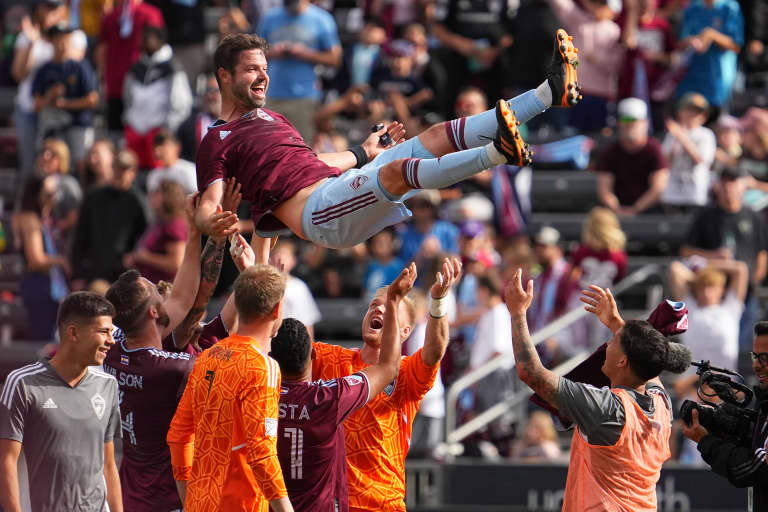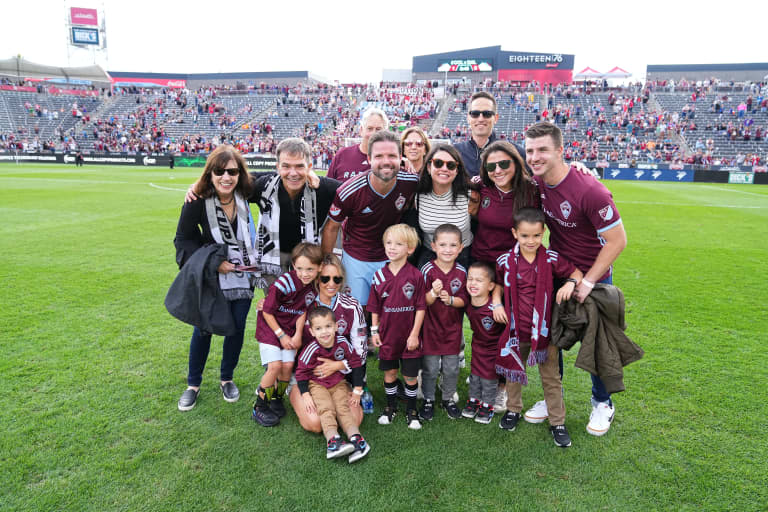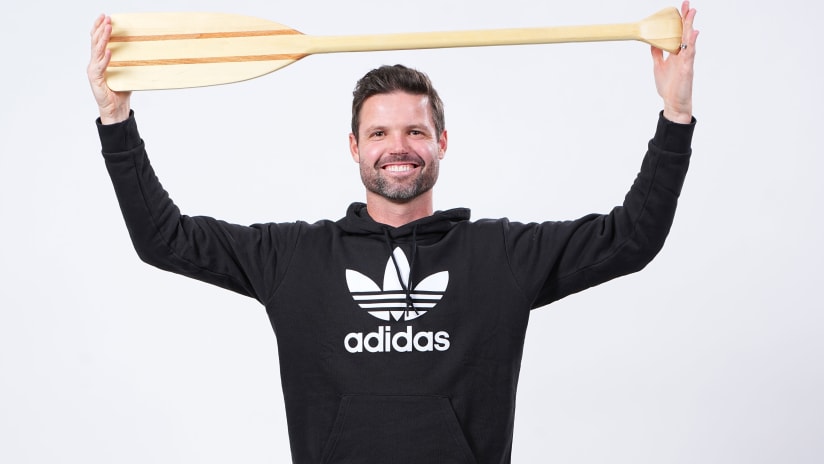Why is it important to talk about mental health?
Yeah, I think it's important to talk about mental health. For me, I feel like I've been lucky. I haven't really thought too much about my mental health until 2020, when a lot of things happened, starting with a global pandemic. A lot of people started talking about their mental health and it kind of became the forefront of conversation, like a lot of things did in 2020. I started to take stock of my career as a player and thought back to some dark moments in my career. I want to preface that by saying, when I said I feel lucky, it's because I had never really thought too much that maybe there were moments in my career or life where I was depressed or where I wasn't feeling great or where anything that would happen to me affected me negatively. I will also say that nobody's challenges with mental health are greater or smaller than anybody else's. Everybody is challenged mentally every single day. There were things in 2020 that affected everyone. The world basically shut down. There were questions of what's next. I have two boys to take care of, I have a wife, I have a house, I have dogs, I have a family outside of Colorado. All of these questions really made me hone in on making sure that I was talking to the right people and having the right conversations. My wife is who I always start with when it comes to challenges, I might be facing mentally. I do feel lucky that I have always had somebody to talk to, somebody to organize my thoughts with.
What was the conversation around mental health like in the MLS community during the pandemic?
I'll mention a stigma immediately and that is professional athletes don't feel any form of depression or mental health challenges or anything. We're supposed to be tough, we're supposed to be hard. There were conversations that I think you usually do not have when it's not 2020 and when there's not a global pandemic and when all of these social rights movements started to come to the forefront. There were just all these question marks, and we weren't in the locker room. A lot of conversations were over WhatsApp or over text. We were coming up to the stadium just to test and we would literally leave our house, come up, test and drive straight home. We were faced with the challenge of going to Orlando for the bubble for the ‘MLS is Back’ tournament, which I can honestly say was the toughest experience I had in my professional career. There were conversations amongst the players where guys probably said some things that you wouldn't usually hear in a locker room. They made themselves more vulnerable, opened up a little bit about the challenges that they were facing at home or with their families, or with their families away from home in different countries, on different continents. That was a time where I really felt like my teammates were my brothers, were my family. It was a challenging time for most players.

How has your retirement from professional soccer affected your mental health?
Yeah, I think I've been challenged. I think I've been challenged more in not my retirement itself, but in my transition from being a soccer player, which is really all I've known. I wouldn't just say 18 years, but my entire life because I started playing soccer when I was five and it was my first love. It's always been my passion. Yes, I went to school. Yes, I have a family, all these super important things as well, but soccer was always top of my mind. I'm lucky that it hasn't changed. I've gone into a role with the Rapids where I'm still talking soccer, I'm still around the game. Athletes are creatures of habit. I think all humans are, but I think athletes in particular are creatures of habit. Now all of a sudden, I'm taking on a couple of new roles and my routine is completely off. And again, this is something that I'll say is a mental challenge, but I also want to say it's not a mental challenge that’s completely thrown my life off. I'm still so lucky to be in a place that I love and in an organization that I love, providing for my family, whereas a lot of other people are facing mental challenges that are nothing like this. I can admit that this has been a challenge for me and my routine is off. Things like how often I see my family is off, how often I walk my dogs is off. I'm meeting new people, people that I've seen a lot, but maybe I haven't developed a relationship with them yet. It’s been a challenge. There's been a couple of days where I've had some anxious moments. There's been a couple of days where it's felt completely normal. I'm moving more towards normal days than high anxiety days. That's just life, that's a part of it. I'm certainly enjoying it so far, but having somebody to talk to like my wife. I'm super close with my parents, which is great. I FaceTime them at times. People that you love, that support you, that understand you, are so important to have to be able to lean on, to be able to talk to, and that certainly helped me in some of my high anxiety moments. I think a lot of people face what maybe on the scale is a smaller challenge, but at the same time, it's still a challenge and it still affects you mentally.
You are the father of two young boys. How do you work on being a good role model for your kids while maintaining your mental health as a parent?
Hopefully, I don't get emotional during this. My boys mean everything to me. I think the world is so different now than it was five years ago, 10 years ago, certainly 30 plus years ago. They're six and five now and it's scary to sometimes think what they're facing out there. They're both at school, we're in a wonderful place, a wonderful neighborhood, but you still just never know. We try to be the best examples that we can be, my wife and I, for them. I think just being a good example is the best that we can provide for them while still teaching them, while still disciplining, while still talking with them and having discussions and keeping a close eye on them. They say stuff sometimes that we question, and we want to know where they heard it from. What's on TV these days, what's on the internet these days, there's a lot out there. And like I said, it's obviously a very different world than it used to be. At the end of the day, my wife and I sometimes will just look at ourselves and at each other and we just say, we are just doing the best we can. We just do the absolute best we can to love them. We believe we are good examples for them. We try to teach them right from wrong. We want them to be themselves because every kid out there is such a special individual and has their own personality and their own mentality. We have to be the absolute best that we can for them and it's a tough job. Parenting there's days we look at each other, we just say this is hard, this is so hard. And we feel like we have some very good little boys. I will admit it's a scary place. It's a scary time to raise kids and maybe it always has been, but we just do the best we can.

What mental health resources would you like to see be made available to professional athletes in the future?
I think one of the biggest things that athletes in particular can understand about mental health is their ability to seek help when they feel like they need it. We are seeing a lot of athletes talk about their mental health. We saw Kevin Love, I think it was in 2020 with the Cavaliers, have a nervous breakdown during a game and leave. He admitted later that he was in a very dark stage of his life and of his career and it had to do with his mental health. To see another athlete like that, who is supposed to be this tough guy, nothing-bothers-him individual, that's not the case. Athletes certainly deal with mental health, with social media these days, with the pressure to perform these days, with the amount of money they're performing for these days, all of these things. I think seeing other athletes, and I know there've been other examples of athletes coming out and saying they had dark moments, that's huge. I want more organizations to have resources, whether it's psychologists, whether it's the ability to go home for the day, do what you need to do to go home for a week to go see your family, whatever it is. I'm certainly not an expert at it, but it needs to be understood by fans and players alike that athletes battle the same mental challenges that everybody does.

